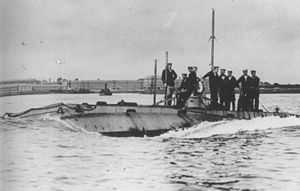HMS Holland 4
 HMS Holland 4 underway at Portsmouth, England. | |
| Career | |
|---|---|
| Name: | Holland 4 |
| Builder: | Vickers Maxim shipyard in Barrow-in-Furness |
| Laid down: | 1902 |
| Launched: | 23 May 1902 |
| Commissioned: | 2 August 1903 |
| Fate: | Foundered 3 September 1912 |
| General characteristics | |
| Type: | Submarine |
| Displacement: | 105 long tons (107 t) submerged |
| Length: | 63 ft 10 in (19.46 m)[1] |
| Beam: | 11 ft 9 in (3.58 m)[1] |
| Propulsion: | Petrol engine, 160 hp (119 kW) Electric motor, 70 hp (52 kW) |
| Speed: | 7 knots (8.1 mph; 13 km/h) submerged |
| Range: | 20 nmi (37 km) at 7 kn (8.1 mph; 13 km/h) submerged |
| Test depth: | 100 ft (30 m) |
| Complement: | 8 (Lieutenant, Sub-Lieutenant, Coxswain, Torpedo Instructor, Chief Engineering Artificer, Leading Stoker, Stoker, Leading Seaman and Able Seaman) |
| Armament: | • 1 × 18-inch (450-mm) torpedo tube • up to 3 torpedoes |
Holland-class submarine No 4 was launched on the 23 May 1902. She was built by Vickers, at Barrow in Furness, Cumbria, United Kingdom, and was laid down in 1902. She was commissioned into the Royal Navy on 2 August 1903. In 1905 the submarine was fitted with a conning tower.[2] She was the only member of the Holland-class to be given this modification.[2] She foundered on 3 September 1912. She was salvaged and used as a gunnery target on 17 October 1914.
References
- ↑ 1.0 1.1 Hutchinson, Robert (2001). Submarines War Beneath the Waves From 1776 to the present day. HarperCollinsPublishers. pp. 25–27. ISBN 0-00-765333-6.
- ↑ 2.0 2.1 Tall, J.J; Paul Kemp (1996). HM Submarines in Camera An Illustrated History of British Submarines. Sutton Publishing. p. 7. ISBN 0-7509-0875-0.
External links
| ||||||||||